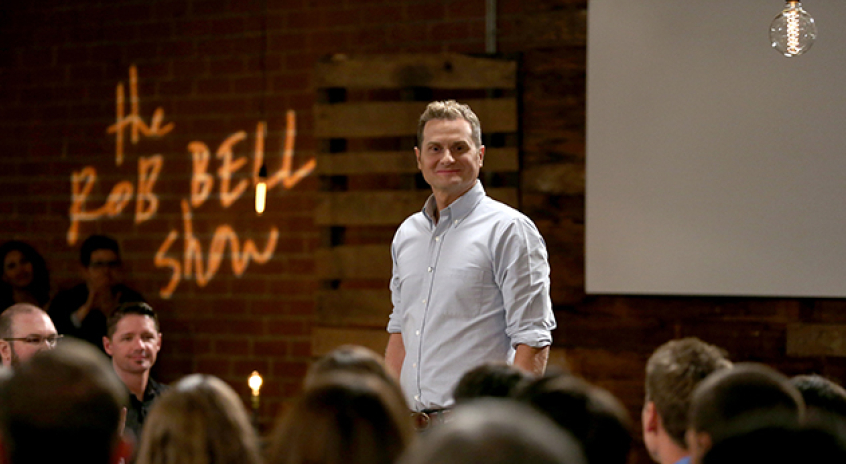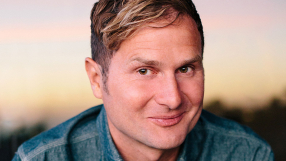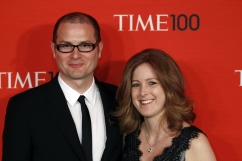
There are few more divisive people in Christendom than Rob Bell. The American writer and ex-pastor went from being the great hope of evangelicalism to accusations of heresy with the publication of his 2011 hell-questioning book Love Wins, and his journey has taken further surprising turns since. He stepped down from his role as teaching pastor at Mars Hill, Grand Rapids; he moved to California and began pitching television series, and he struck up an unlikely friendship with Oprah Winfrey.
The combination of those last two plot twists in the Rob Bell story leads us to The Rob Bell Show, a new mixed-format TV talk show which premiered on Oprah's OWN network in the US last night (Sunday, 21 December). Hotly anticipated by many, and written off in advance by others who can't stomach Winfrey's own mish-mashing of religious beliefs and self-help ideas, the series is billed as 'shining a bright light on the topics we most want to talk about but often don't know how to approach.' Pitched at people who perhaps feel 'spiritual but not religious', the show forms part of Oprah's 'Super Soul Sunday' programming strand, which inoffensively explores ideas of spirituality without forcing them into a uniquely Christian worldview.
Those of us who've followed Bell's career for the past decade or so can be forgiven for finding this a little surreal. Rob Bell – the man who wrote Velvet Elvis and made all those cool Nooma films – now has a prime-time TV show on the Oprah Winfrey Network. I'm sure I'm not alone in being utterly fascinated with how that might turn out.
Full disclosure: I don't know Rob Bell well, but I know him a little. I've spent a fair amount of time interviewing him over the years, and partly as a result I am inclined to both like him, and believe the best of his intentions. So I'm not going to pretend I wasn't willing the show to be great. And I hope that to some degree, the same is true of all Christians. Whatever Bell has (or hasn't) said about hell or other aspects of Christian orthodoxy, he stood last night on an unprecedented platform. The OWN network is available in over 80 million American households; despite the proliferation of Christian media in the US, no other preacher is going to come close to this in terms of mainstream exposure. So while many may fear his theology, we cannot doubt the potential Bell now has to make a positive impact with the Christian message.
The first show kicks off with a Nooma-style piece to camera on the streets of LA, as Bell explains the premise of the episode – that there are difficult, painful parts of all our lives which we don't know what to do with, and that he can give us a way to 'own' those parts of our stories.
Then the main section of the show begins. Bell sits, surrounded on three sides with a couple of hundred young, attractive people, and with three multi-purpose screens behind him (he can write on them; he can project things onto them). The show's set has the look of an achingly cool coffee joint which possibly doubles as a jazz club by night; the design brief was clearly dominated by the word 'hipster'. Anyway, he seems relaxed; he jokes with members of the audience about goofy photographs he's obtained of some of them; he's clearly among friends, or at least, fans.
Suddenly, a change of pace. The Rob Bell we all know and remember appears. He stands; he begins walking around with purpose, using his hands and speaking in that deliberate, affected manner which has proved so effective in his preaching. We need to be at peace with our past, he declares. On Twitter, hundreds of people repeat that mantra. It's exciting to see Rob Bell circa-2006 in full flow; but the context is strange. Again, pinch me. Rob Bell has a show on the Oprah channel.
Then we're into another video insert – Rob meeting Victor, a man with a traumatic/uplifting life story, interviewing him in his home. Rob doesn't do a lot; arguably he doesn't need to. Victor is a great case study; unwanted by his mother, inspired by a teacher, now determined to inspire and encourage others. It's all very moving, although at this point we still seem to be some way from a connection with the Christian faith...
Another video interview follows, this time with a woman whose father committed suicide. This time Rob is a little more involved, and the story seems to be tying more neatly now into the whole show. We're clearly going somewhere – and as we flick back to the Nooma style, Rob starts to tie the threads: "There's this power every time you hear a story of someone owning their past," he says.
Back in the studio, Rob keeps using this phrase 'the reconciliation of all things' (Twitter loves it). And then, bang –halfway through, the penny drops. Colossians 1:20 appears on the screen behind Rob:
"and through him to reconcile to himself all things, whether things on earth or things in heaven, by making peace through his blood, shed on the cross."
And suddenly he's preaching – an intense five-minute segment in which Rob could be back on the stage at Mars Hill. 'The universe wants you to be whole,' he proclaims – but just before you start to worry that he's afraid to mention God, he throws in The Cross – and tells us that it's the cross which contains this power for reconciliation (this doesn't, by the way, create an opportunity for him to push some sort of 'universalist' agenda – I'd describe it much more as old-fashioned pre-evangelism).
Then the gear shifts again. Rob pulls back; the overarching message could instead be that pain is only healed when it's brought into the light and shared with others, and those who wish to can ignore the explicit Christian elements of what he's said and still feel uplifted. I'm sure that's the point. He takes a few questions from the audience; they feel a bit staged – I'm pretty sure they weren't; and he finishes with a knowing little gag about Love Wins and the people who didn't like it (and also didn't read it). So it seems we now have an established format: problem, discussion, resolution, questions (although whether subsequent episodes follow suit remains to be seen), with an element of Biblical content, but not an overwhelming amount. Oh, and just like the Rob Bell of old, he ends with a benediction, tying the whole thing together with a prayer the audience don't realise is a prayer.
I liked it. I thought it worked well, I can't think of another TV show like it, and it's hard to think of a better way to discuss deep spiritual topics. The mix of styles involved kept my interest, and I was impressed (as I think I was meant to be) by the careful crafting of the episode. Rob comes across very wise, and very likeable, which is important because of course the vast majority of people who'll watch his show will barely have heard of him before now.
I'm sure many Christians will watch The Rob Bell Show and feel cross, or disappointed. I hope they don't get too hung up on the self-help elements of the show, which were always inevitable when Oprah was involved. In the midst of a secular culture, and in a world full of people struggling with every kind of pain, they just let a Christian preacher on to prime time TV to tell everyone that ultimately, the Cross is the solution to that pain. Sure, he said a lot of other things – he had to. But last night, Rob Bell told America: "The cross speaks of the reconciliation of all things." I think we should be grateful that he had that opportunity.
Martin Saunders is an author, screenwriter and the Deputy CEO of Youthscape. Follow him on Twitter @martinsaunders
















